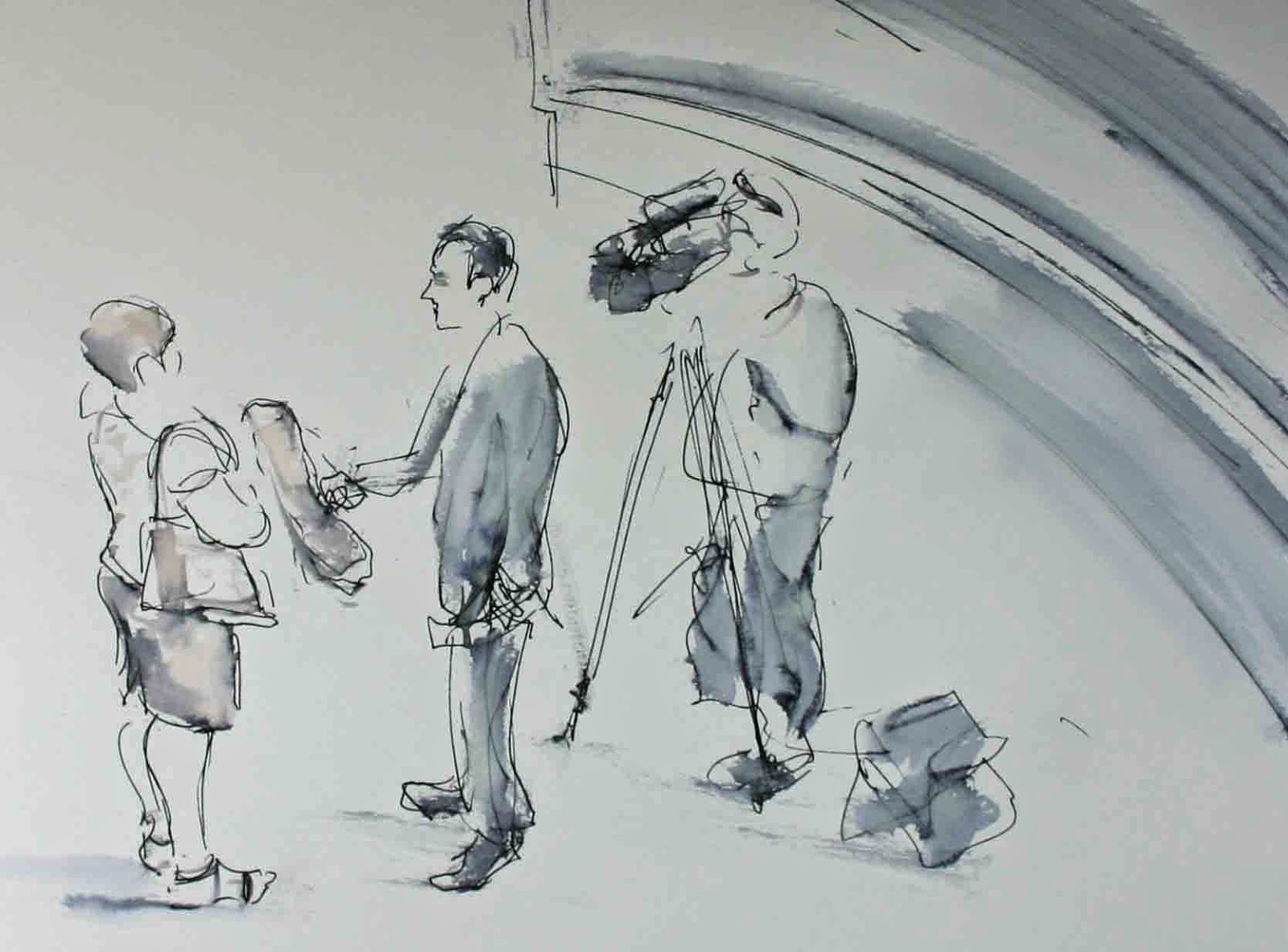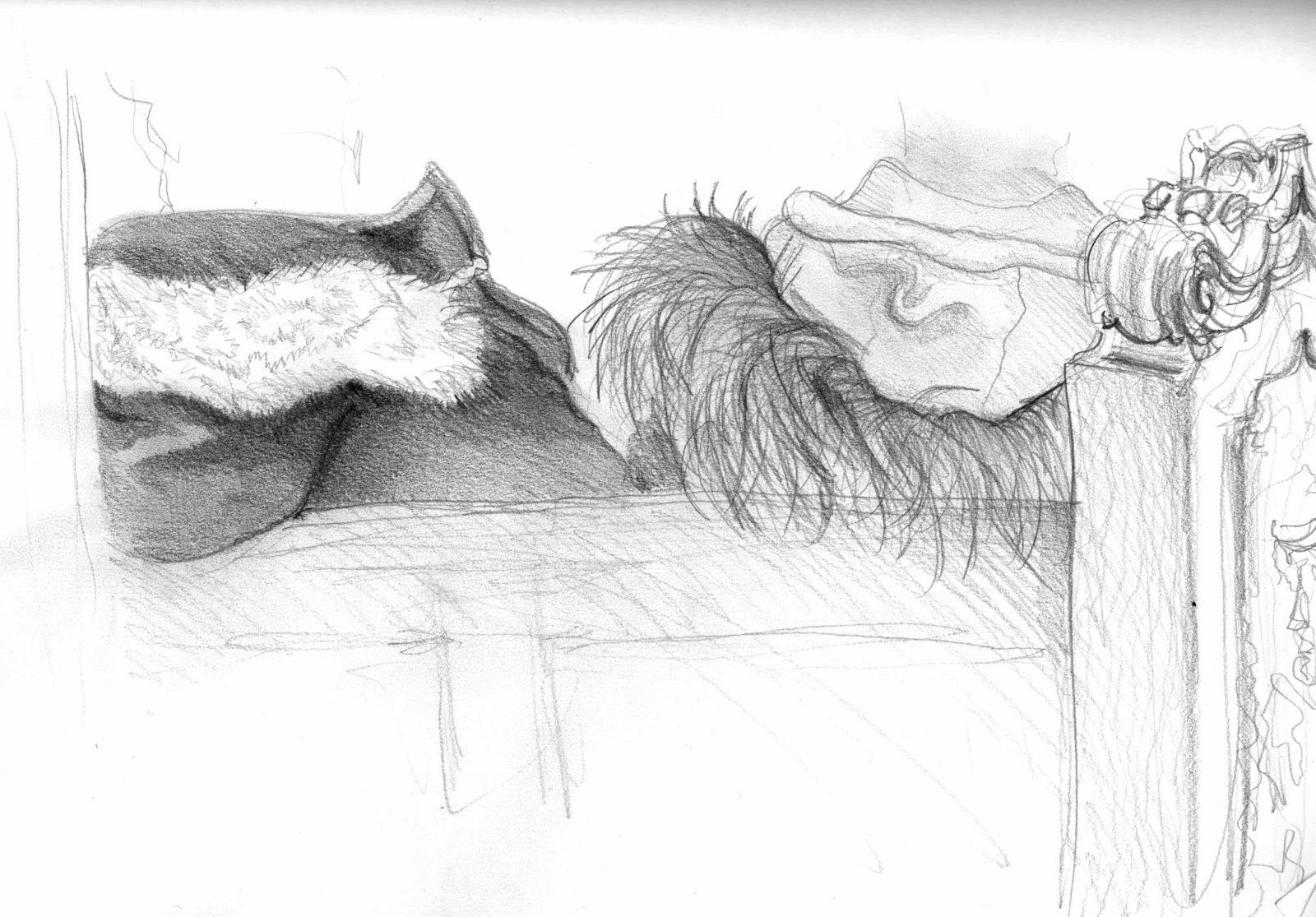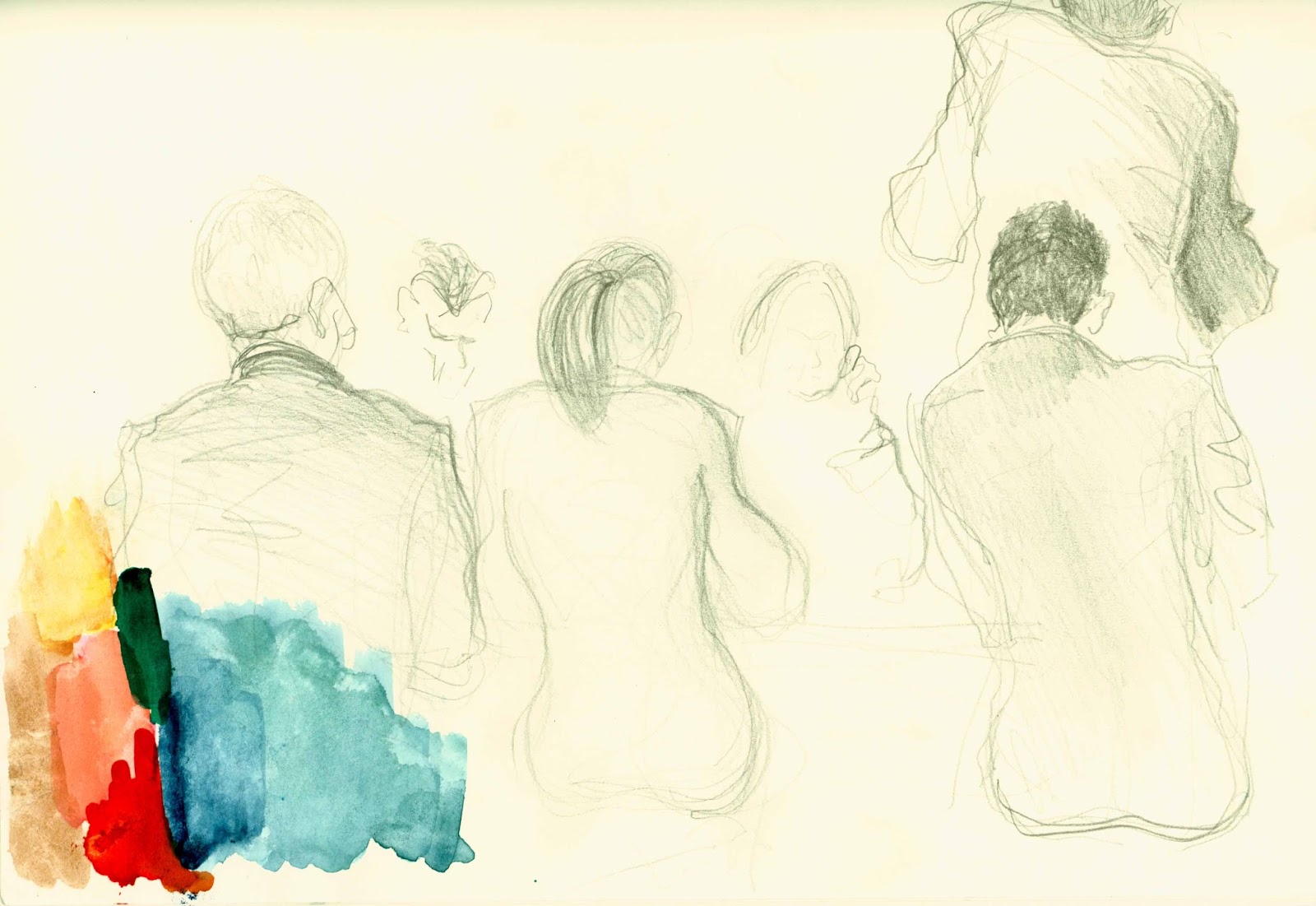[contextly_auto_sidebar]

Sketches by Isobel Williams. www.isobelwilliams.blogspot.co.uk
This week’s decision by the Court of Appeal in Incedal [2016] EWCA Crim 11 is profoundly important for open justice and the public understanding of the security threats faced by our communities and for the accountability of those tasked with combatting security threats.
Erol Incedal was prosecuted for terrorism offences. The prosecution asked that evidence be heard in camera (ie, in closed hearing), raising the possibility that if a hearing was open then charges may be withdrawn. Following submissions by the parties and media interests, and trial judge and the Court of Appeal decisions, the position reached was that where evidence would be heard in camera then 10 ‘accredited journalists’ would be permitted to attend and take notes, though the notes could not be removed from the court and there were to be reporting restrictions. However, at the conclusion of the trial the court would review the evidence to see whether more information may subsequently be reported. The trial judge maintained the restrictions. The media appealed, asking the Court of Appeal to permit publication.
In dismissing the appeal on Monday the Court set out the approach to be taken when deciding whether security-sensitive evidence in criminal trials should be heard in public or in camera or in a half-way house where proceedings are closed but journalists may be present, though the evidence may never become public. In its reasoning and in addressing broader issues of principle, all manner of important issues that arise. I want to draw attention to just a few here.

The basis for departing from open justice principles
First, there is welcome clarity in the Court’s statements about whose decision it is to decide whether hearings will be held in camera and the place of DPP decisions about whether to prosecute in the event that hearings will be public. The judgment makes it clear that a decision about whether to hold an in camera hearing is a decision for the court and that any ‘statement of the DPP that unless evidence is heard in camera there may be no prosecution’ will not be determinative [53, 57]. On the contrary, that is not the relevant question: ‘the proper approach of the court is to examine the nature of the evidence and to determine the effect of hearing it in public’ [57].
The decision goes some way to resolving a conflation of the rationales for the process that was adopted in Incedal. The prosecution arguments and the decisions were throughout framed as being concerned with the question of whether a public hearing would have the tendency to frustrate the administration of justice (eg,[4]). The thorny questions are where exactly the interference with the administration of justice lies and, moreover, whether the rationale really lies in the administration of justice or whether it lies elsewhere. This is now more clarity on this.
The Court of Appeal is clear that the matter not to be decided on the basis of whether a public hearing would result in a discontinuation of the prosecution; that, it seems, is not where the interference with the administration of justice lies (although it was the approach taken in the decisions prior to the trials [54]). It also does not seem to revolve around any possible refusal of the Executive (especially the security agencies) to provide the DPP with the evidence. The Court makes it crystal clear that:
‘… the Security Services and the police must provide to the prosecutor all the assistance the prosecutor requires. It is part of their duty to abide by the rule of law and the constitutional principles we have set out.’ [62]
While any refusal to assist the prosecution must surely be an interference with the administration of justice, that refusal is not quite the question that is before the court.
Instead, the interference with the administration of justice appears to lie in the effects on the court:
‘If the court’s decision was premised on the basis that the DPP might not continue with the prosecution if the material was made public, it is difficult to see how it would be open to the court to decide subsequently to make that evidence public, as the prosecution would have proceeded only on the basis it would not be and the court had not made a determination as to the effect of that evidence on national security and why it could not be made public.’ ([59], emphasis added)
The latter part of that sentence is the key: the decision is ultimately to be based on an assessment by the court (with considerable deference to the executive view) that a public hearing would pose a risk to national security. The court is, in essence, saying that the public interest in prosecuting terrorism offences is sufficiently strong that there should be departures from established principles of open justice, and the ‘strong public interest’ in the evidence being placed in the public domain [70] is outweighed by national security considerations. Although it has been framed in terms of frustration of the administration of justice (eg, [4] and the first part of the extract above), that window dressing should be dropped and the basis for the argument placed on more straightforward footing: decisions of this kind are about national security.

Normalising departures: from exception to management
Secondly, in permitting a departure from established principles of open justice in order that national security is protected and that it highlights the practical and constitutional importance of deference to executive assessments of security threats, the decision is unsurprising and now almost unremarkable. It should be remarkable, especially as it is a criminal case, but, alas, it is becoming increasingly difficult to see it as such. On the contrary, while it would be too strong to describe secrecy as commonplace, Incedal certainly continues a legislative and judicial trend of recent years whereby the circumstances in which secrecy will be permitted are being expanded. Secrecy is being normalised and with the imprimatur of the Court of Appeal in the criminal context it is difficult to see it now as exceptional.
The result of the decision is that the pathway for national security cases is no longer one where secrecy in court proceedings is about exception – you can only have so many cases allowing secrecy before they become a category of considerable scope and volume. Instead, the national security pathway is now one where secrecy in proceedings is about management and, it is to be hoped, putting in place provisions and systems that curb the dangers and enhance as far as possible fidelity to open justice and the rule of law.
Normalising departures from open justice is disappointing as a matter of constitutional principle, democratic accountability and public confidence in the courts and the executive. Installing processes that would manage departures will surely entrench them and see their proliferation. It is a dangerous route. However, the current situation is more dangerous: there are ever-increasing departures that are characterised by inconsistency and often inadequate consideration of open justice issues. The time has come for systematic protections that provide mechanisms that will help ensure that the public interest in open justice is adequately and systematically considered where secrecy is proposed.
In what follows I am not suggesting that the Justice and Security Act or the myriad other mechanisms which provide for secrecy in proceedings and the use of special advocates are necessary, just or wise – to my mind there remain may questions in that regard – but I am suggesting that there are flaws which need urgently to be remedied. The Court of Appeal judgment opens some doors in these respects.

Some steps towards protecting the public interest in open justice
Among the issues are several which have been pointed out for some time but which are (again) apparent in the Court of Appeal’s decision. Among them, first, while the media is equated with protecting the public interest, that is far from satisfactory. The media are a proxy for the public interest but an imperfect one. Others such as civil society organisations or legal professional bodies may be interested and valuable representatives of the public interest; they should be contemplated as observers in the same way media interests are. There need to be procedures in place which ensure that there is notification to a wider body of public interest representatives and opportunities for those representatives to make submissions.
Secondly, the Court stated [66] that while the prosecution and defence arguments may be of assistance to the judge, there are interests – presumably the interest in open justice – that they cannot always adequately represent:
‘… there are some cases, of which the present… may be an example, where the judge would be greatly assisted by an independent lawyer assigned to provide assistance in the same way as in the present case both the [trial] judge and this court were assisted by counsel for the media parties… . We would expect assistance by an independent [security cleared lawyer] to be provided to a judge where such assistance was requested by a judge.’
It is suggestive of the path towards special advocates representing the public interest.
Thirdly, the Court refers [at 30] to counsel and solicitors for the media parties having had access to the closed judgment, on undertakings of confidentiality. This is entirely appropriate. Along with public interest special advocates, it is also a point which may be relevant in current considerations of the Draft Investigatory Powers Bill where submissions have been made that media counsel or special advocates may be consulted in matters concerning journalistic sources or legal professional privilege. (Disclosure: I refer to submissions by my own organisation, the Bingham Centre for the Rule of Law.)
Fourthly, and very importantly, the Court concludes with an observation that where a judgment has been closed on national security grounds there is no procedure for later opening it once the danger to national security has passed. This issue was raised in debates in the passage of the Justice and Security Bill and an amendment proposed in the Lords would have seen legislative provision for subsequent review of cases, but while the government acknowledged the force of the point they saw it as too difficult to resolve at that time and the amendment was withdrawn. It was also considered in the Commons Public Bill Committee. The Divisional Court was asked to consider the issue in The Queen (on the application of Maya Evans) v SSD [2013] EWHC 3068 but declined to do so on the grounds that it was a matter for parliament and parliament had recently considered it and chosen not to address it.
The Court of Appeal has taken a big step forward by directing that a working party be established to consider how these issues are to be addressed in future [80]. This is a very welcome development. As it stands there are no systems in place under which closed judgments can be opened and so, unless something is done, they remain closed forever.
Fifthly, there is a revelation at the end of the judgment that is somewhat astonishing:
‘… the closed judgments which contain the detailed reasons why the court has decided that the evidence should be held in camera are not retained within the court files or, as far as we have been able to ascertain, in any specified place within the court.’
In a masterpiece of judicial understatement, they say, ‘This is not satisfactory.’ It is to be hoped that the closed annex to Monday’s judgment [73] will not suffer the usual fate.
There is much that is unsatisfactory about secrecy in court proceedings. The judgment in Incedal does not make things satisfactory. In some ways it makes things worse by contributing to the normalisation. But there are opportunities for improvement that should not be missed and which could – and should – prompt improvements across the range of secrecy provisions.
Lawrence McNamara is Deputy Director and Senior Research Fellow at the Bingham Centre for the Rule of Law. In 2012 he gave evidence to the Joint Committee on Human Rights inquiry into the Justice and Security Bill, including on many of the issues above, and wrote about the earlier stages of the Incedal case here for Inforrm, here for the UK Human Rights Blog, and here again for Inforrm






